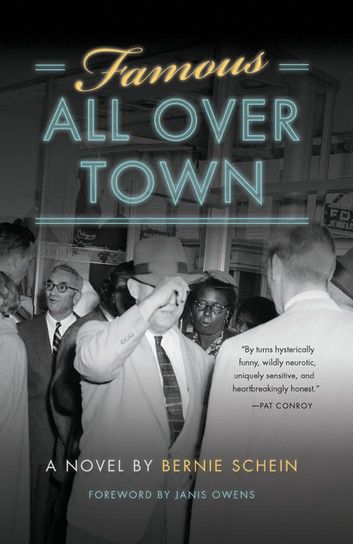Novelist Walker Percy once said that the only remaining unexplored territory in southern literature was the Jewish southerner. Famous all over Town, the first novel from southern storyteller Bernie Schein, stakes a claim on Percy''s unexplored terrain with a comically candid multigenerational account of two Jews, a lowcountry native and a northern transplant, at the epicenter of momentous events in the sleepy southern coastal hamlet of Somerset, a fictitious stand-in for Schein''s native Beaufort, South Carolina.
Schein''s diverse and memorable cast includes southern Jewish lawyer Murray Gold and his foil, displaced New York psychiatrist Bert Levy; emotionally scarred USMC drill sergeant Jack McGowan and his alluring and unconventional wife, Mary Beth; corrupt and adulterous sheriff Hoke Cooley, his deeply conservative wife, Regina, and their violent son, Boonie; African American madam and later city councilwoman Lila Trulove (also Hoke''s mistress), her brilliant daughter, Elizabeth, and her conflicted Harvard-bound son, Driver; fallen southern belle turned voice of a generation Arlanne Palmer; remorseful Vietnam veteran and flamboyant transvestite Royal Cunningham; and inspirational schoolteacher Pat Conroy. Famous all over Town also uses its web of interconnected storylines to make its setting, the eponymous town itself, a central character with a personality and an arc as complete as that of any other member of the deftly rendered cast.
Delving beneath the surface of the southern status quo, Schein''s tale follows these interconnected lives through the private and public upheavals in small-town life from the turbulent 1960s to the eve of the new millennium, confronting the ramifications of the civil rights era, Vietnam, Watergate, and--closer to home--a deadly version of the infamous Ribbon Creek incident. Somerset''s colorful citizens also confront their own repressed memories, conflicted identities, burgeoning ambitions, and romantic entanglements. Even as events unfold to often-uproarious effect, Schein''s novel holds true to a deeply realized sense of intimacy and authenticity in the interactions of its myriad characters as revelations expose how these disparate lives are conjoined in surprising ways. Shifting points of view place readers squarely in the mindsets of many of Somerset''s key citizens as Schein lovingly and laughingly invites us to reconsider what it means in the modern south to be white, black, Jewish, Christian, military, civilian, sane, insane, old, young, male, female, gay, and straight--and to be of a place rather than merely in it.
Best-selling southern novelist and self-described "Florida cracker" Janis Owens, author of American Ghost, The Cracker Kitchen, and other books, provides a foreword.






![塔木德:猶太人的致富聖經[修訂版]:1000多年來帶領猶太人快速累積財富的神祕經典 塔木德:猶太人的致富聖經[修訂版]:1000多年來帶領猶太人快速累積財富的神祕經典](https://media.taaze.tw/showLargeImage.html?sc=11100697818)





